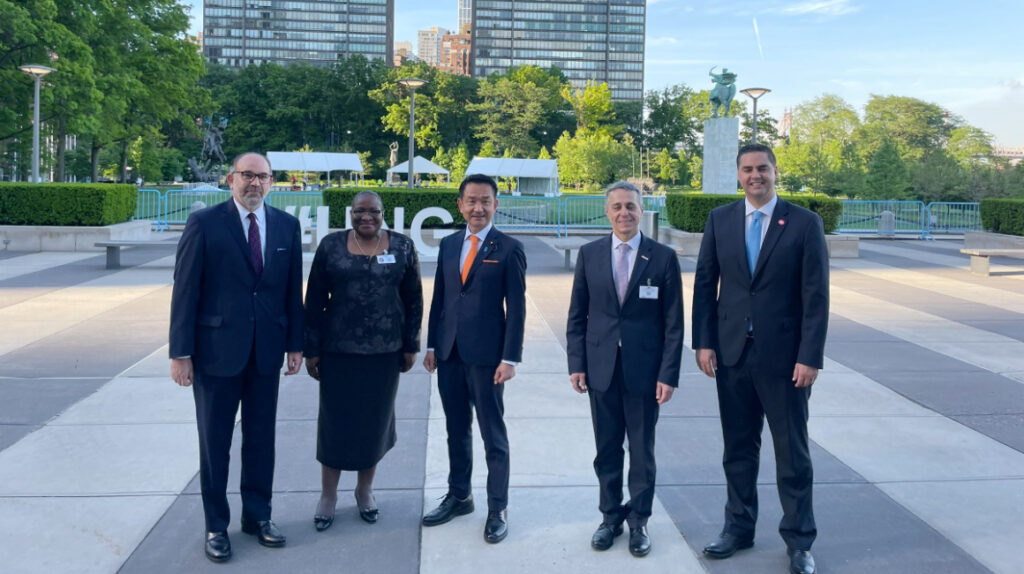New Members Join United Nations Security Council
Posted on 03-02-23 11:40 am
On January 3, Ecuador, Japan, Malta, Mozambique, and Switzerland officially began their two-year term as non-permanent members of the United Nations Security Council. The flag installation ceremony, initiated by Kazakhstan in 2018, marked the start of their responsibilities and was presided over by Kazakhstan’s permanent representative, Akan Rakhmetullin. Rakhmetullin expressed confidence that the new council members would bring a wealth of knowledge and perspective to global issues of peace and security.
Role of Non-Permanent Members
The United Nations Security Council is composed of 15 members, with 5 permanent members (the United States, the United Kingdom, France, Russia, and China) and 10 non-permanent members. The non-permanent members are elected for two-year terms by the UN General Assembly, with five new members replacing outgoing ones each year. In addition to participating in the decision-making process of the Security Council, non-permanent members also have the opportunity to bring attention to specific issues and regional concerns.
Outgoing Members
The incoming members (Ecuador, Japan, Malta, Mozambique, and Switzerland) are replacing India, Ireland, Kenya, Mexico, and Norway, whose two-year terms have now come to an end. These countries have made significant contributions to the Security Council during their tenure and will continue to play important roles in global affairs.
Continuing Members
Albania, Brazil, Gabon, Ghana, and the United Arab Emirates are currently in the middle of their two-year term as non-permanent members of the Security Council. These countries will continue to work alongside the new members to address the pressing issues facing the international community.
UNSC Membership
The UNSC is the most powerful body within the United Nations and is responsible for maintaining international peace and security. It has 15 members in total, including the five permanent members (China, France, Russia, the United Kingdom, and the United States) who have veto power, and 10 elected members who serve two-year terms. The elected members are allocated by global regions and are replaced every two years.
Significance of UNSC Membership
- Becoming a member of the UNSC is considered a significant diplomatic accomplishment for a country, as it can increase its global profile and give smaller nations a larger voice on international peace and security issues.
- The council has the power to deploy peacekeeping missions, impose sanctions, and address conflicts and flashpoints, as well as addressing issues such as terrorism and arms control.
The United Nations Security Council plays a crucial role in maintaining international peace and security, and the contribution of its non-permanent members is vital to this mission. The incoming members (Ecuador, Japan, Malta, Mozambique, and Switzerland) bring a diverse range of experiences and perspectives to the table, and their participation will no doubt enrich the work of the Council. As the world faces numerous challenges, the cooperation and collaboration of all members will be essential in finding solutions and promoting peace.



Leave a Reply
Guest
TWSfSopc
1
Guest
TWSfSopc
1
Guest
Guest
Guest
Guest
Guest
Guest
Guest
Guest
Guest
Guest
Guest
Guest
Guest
Guest
Guest
Guest
Guest
Guest
TWSfSopc
1
Guest
Guest
Guest
Guest
Guest
Guest
Guest
Guest
Guest
Guest
Guest
Guest
Guest
Guest
Guest
Guest
Guest
Guest
Guest
Guest
Guest
Guest
Guest
Guest
Guest
Guest
Guest
Guest
Guest
Guest
Guest
Guest
TWSfSopc
1
Guest
Guest
Guest
Guest
Guest
Guest
Guest
Guest
Guest
TWSfSopc
1
Guest
Guest
Guest
Guest
Guest
Guest
Guest
Guest
TWSfSopc
1
Guest
Guest
Guest
Guest
Guest
Guest
Guest
TWSfSopc
1
Guest
Guest
Guest
Guest
TWSfSopc
1
Guest
Guest
Guest
Guest
TWSfSopc
1
Guest
Guest
Guest
Guest
TWSfSopc
1
Guest
Guest
Guest
Guest
TWSfSopc
1
Guest
Guest
Guest
Guest
TWSfSopc
1
Guest
Guest
Guest
TWSfSopc
1
Guest
Guest
lxbfYeaa
1
Guest
lxbfYeaa
1
Guest
lxbfYeaa
1
Guest
lxbfYeaa
1
Guest
lxbfYeaa
1
Guest
lxbfYeaa
1
Guest
lxbfYeaa
1
Guest
lxbfYeaa
1
Guest
lxbfYeaa
1
Guest
lxbfYeaa
1
Guest
lxbfYeaa
1
Guest
lxbfYeaa
1
Guest
Name
katana
Guest
lxbfYeaa
1
Guest
Name
katana
Guest
lxbfYeaa
1
Guest
Name
katana